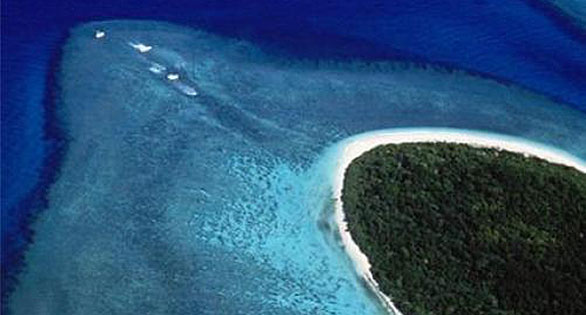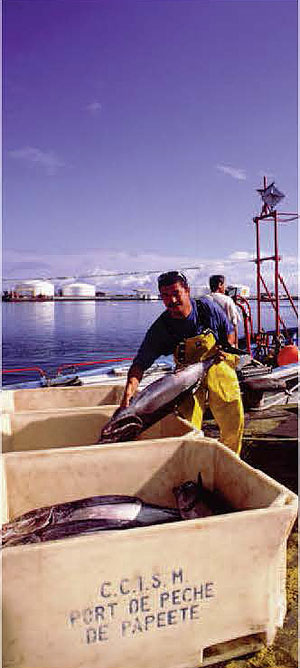
Hugely dependent on coral reefs for their food supplies, the peoples of tropical Pacific Island nations face an uncertain future and dramatic declines in fish stocks in the coming decades if global warming continues unabated, according to a new study
Isolated in the middle of the tropical Pacific Ocean, many island nations rely on fishing for their food security and economy. But a new study by an international team of scientists suggests that global warming could dramatically reduce their accessible fish resources over the coming decades.
Published in the journal Nature Climate Change, a study by the IRD, the Secretariat of the Pacific Community (SPC) and their French, Australian and American partners, the study is entitled Mixed Responses to Tropical Pacific Fisheries and Aquaculture to Climate Change. According to IPCC climate forecasts, the quantity of coral reef fish, essential for the inhabitants’ food, could drop by as much as 20 percent by 2050.
Tuna fleeing eastwards

Island fishermen in French Polynesia: climate change is raising questions about their future role in supplying food to their island populations.
The scientists studied the response of the fish biomass to climate change in the Pacific, according to the forecasts of the intergovernmental panel on climate change (IPCC). Fishing for skipjack in particular, a fish in the tuna family making up 90 % of catches, will be seriously affected. According to the models, the rise in surface water temperature, greater in the western ocean, will lead to the migration of tuna towards eastern Polynesia. Thus, catchment areas will move away from the Melanesian coast, the Salomon islands or Papua New Guinea. The exodus of tuna from the territorial waters of these countries will be a significant economic loss. Fishing rights paid by major international fisheries are an important source of revenue for these small insular Nations.
Coral ecosystems threatened
Along the coasts, the availability of coral fish is also under threat. Forecast ocean warming will increase coral bleaching leading to the death of numerous reefs. Population growth in these territories, preserved up to now, will also exert strong pressure on coral ecosystems – exploitation, damage, pollution, etc. The recovery rate of coral reefs should fall from 40 % throughout the Pacific today, to 10 or 20 % in 2050. According to the study, this loss will reduce by 20 % the quantity of coral fish, an essential resource for local populations.
Sectors to develop
Some Pacific islands could however turn to aquaculture and fresh-water fisheries. On land, it’s a whole different scenario. The expected rise in rainfall, increasing the surface of lakes, rivers, etc. by 10 % by 2050, could be beneficial to these activities. In their study therefore, the scientists are encouraging the development of these sectors. To make up for expected losses, they are inviting governments to facilitate access of local fishermen to tuna resources – for example by installing fish aggregation devices, sorts of floating pontoons that attract them, along the coast. Finally, other fish resources still unexploited, could be drawn upon, such as mackerel, anchovy, sardine, etc.
Minimising the risks by preserving reefs and maximising opportunities: a challenge that the public authorities of these small Pacific Nations will have to face in the coming decades to cope with climate change and the increasing need of their growing population for fish.
References
Bell J., Ganachaud Alexandre, Gehrke P., Griffiths S., Hobday A., Hoegh-Guldberg O., Johnson J., Le Borgne Robert, Lehodey P., Lough J., Matear R., Pickering T., Pratchett M., Sen Gupta A., Senina I. and Waycott M. Mixed responses of tropical Pacific fisheries and aquaculture to climate change, Nature Climate Change , 2013. doi:10.1038/nclimate1838
Partners
CPS, IRD, CLS, UNSW, CSIRO, AIMS, AusAid
Sources
Published April 2013
Courtesy IRD (Institut de recherche pour led developpement): Original Article
Image: © IRD/ P. Laboute
Image: IRD / P. Laboute, Atoll en Nouvelle-Calédonie




